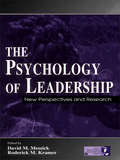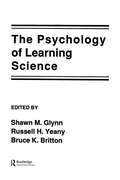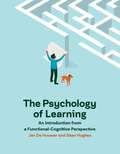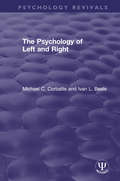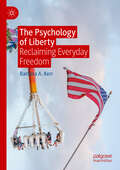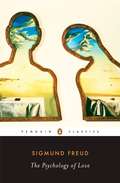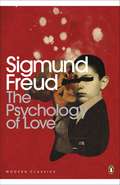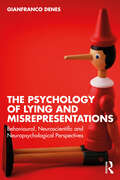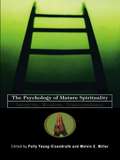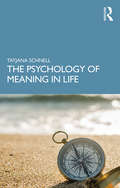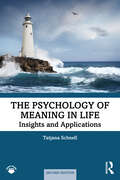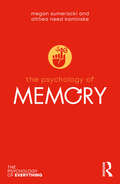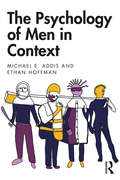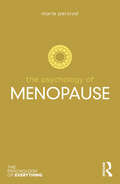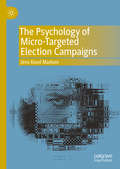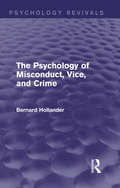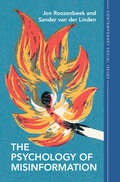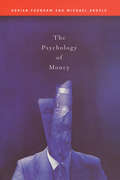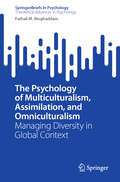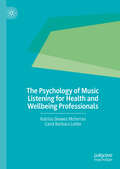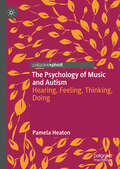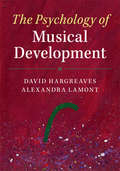- Table View
- List View
The Psychology of Leadership: New Perspectives and Research (Organization and Management Series)
by Roderick M. Kramer David M. MessickIn this book, some of the world's leading scholars come together to describe their thinking and research on the topic of the psychology of leadership. Most of the chapters were originally presented as papers at a research conference held in 2001 at the Kellogg School of Management of Northwestern University. The contributions span traditional social psychological areas, as well as organizational theory; examining leadership as a psychological process and as afforded by organizational constraints and opportunities. The editors' goal was not to focus the chapters on a single approach to the study and conceptualization of leadership but rather to display the diversity of issues that surround the topic.Leadership scholars have identified a host of approaches to the study of leadership. What are the personal characteristics of leaders? What is the nature of the relation between leaders and followers? Why do we perceive some people to be better leaders than others? What are the circumstances that evoke leadership qualities in people? Can leadership be taught? And so on. The contributions to this book examine these important questions and fall into three categories: conceptions of leadership, factors that influence the effectiveness of leadership, and the consequences and effects of leadership on the leader. All in all, the chapters of this volume display part of a broad spectrum of novel and important approaches to the study of the psychology of leadership. We hope that they are equally useful to those who are or would be leaders and to those who study the topic. As recent events have served to remind us, it is too important a topic to be ignored by psychologists.
The Psychology of Learning Science
by Bruce K. Britton Shawn M. Glynn Russell H. YeanyFocusing on the teaching and learning of science concepts at the elementary and high school levels, this volume bridges the gap between state-of-the-art research and classroom practice in science education. The contributors -- science educators, cognitive scientists, and psychologists -- draw clear connections between theory, research, and instructional application, with the ultimate goal of improving science teachers' effectiveness in the classroom. Toward this end, explicit models, illustrations, and examples drawn from actual science classes are included.
The Psychology of Learning: An Introduction from a Functional-Cognitive Perspective
by Sean Hughes Jan De HouwerAn introduction to the psychology of learning that summarizes and integrates findings from both functional psychology and cognitive psychology.Learning unites all living creatures, from simple microbes to complex human beings. But what is learning? And how does it work? For over a century, psychologists have considered such questions. Behavior analysts examined the ways in which the environment shapes behavior, whereas cognitive scientists have sought to understand the mental processes that enable us to learn. This book offers an introduction to the psychology of learning that draws on the key findings and major insights from both functional (behavior analysis) and cognitive approaches.
The Psychology of Left and Right (Psychology Revivals)
by Michael C. Corballis Ivan L. BealeOriginally published in 1976, this title deals with the problem of how we tell left from right. The authors argue that the ability to tell left from right depends ultimately on a bodily asymmetry, such as preference for one or the other hand, or dominance of one side of the brain. This has implications for child development, reading disability, navigation, art, and culture.
The Psychology of Liberty: Reclaiming Everyday Freedom
by Barbara A. KerrThis book introduces a new concept of liberty, based on the idea that being free means being the humans we evolved to be in our first 200,000 years. With perspectives from psychology, anthropology, and sociology, the author shows how throughout history, dominant individuals and status hierarchies have injured our psychological and physical well-being. Readers discover simple behaviors that make humans feel free (like gossiping, playing, making, and storytelling) and are prompted to a compelling reflection threats to this freedom. Psychology of Liberty: Reclaiming Everyday Freedom explores the dynamics of creative families, communities, and societies, showing how they sustain human freedom. The author identifies new pathways to freedom, drawing from examples of resistance to authoritarianism. In this timely and ambitious book, the author combines personal narrative with academic research to make complex ideas accessible.
The Psychology of Love
by Sigmund FreudFreud?s landmark writings on love and sexuality?including the famous case study of Dora? newly translated and in one volume for the first time This original collection brings together the most important writings on the psychology of love by one of the great thinkers of the twentieth century. Sigmund Freud?s discussions of the ways in which sexuality is always psychosexuality?that there is no sexuality without fantasy? have changed social, cultural, and intellectual attitudes toward erotic life. Among the influential pieces included here are ?On Female Sexuality,? ?The Taboo of Virginity,? ?A Child Is Being Beaten,? and the widely cited case history of the eighteen-year-old Dora, making The Psychology of Love essential reading for anyone who wants to understand Freud?s tremendous legacy. .
The Psychology of Love and Hate in Intimate Relationships
by Katherine AumerSocial psychology has made great advancements in understanding how our romantic relationships function and to some extent, dissolve. However, the social and behavioral sciences in much of western scholarship often focus exclusively on the more positive aspects of intimate relationships--and less so on more controversial or unconventional aspects. The goal of this volume is to explore and illuminate some of these underrepresented aspects: aspects such as non-monogamy, female orgasm, sadism, and hate, that often function alongside love in intimate relationships. Ultimately, by looking at intimate relationships in this way, the volume contributes to and advocates for a more holistic and comprehensive view of intimate relationships. Throughout the volume, contributors from social, clinical, and evolutionary psychology cover love and hate from a variety of (sometimes opposing) perspectives. The first section, covers love and the changing landscape of intimate relationships. Its chapters review the current literature and research of understudied topics like non-monogamy, female orgasm, sexual fantasies, and the viewpoint of love as something other than positive. The second section explores hate and how hate can operate in intimate relationships--for example, the appearance of sadistic behavior and debates the nature of hate as either a motivation or emotion. The volume concludes, by looking at ways in which the appearance of hate in relationships can be dealt with and overcome successfully. Taken together, these two sections reflect the full variety of experiences within intimate relationships. With the aim of exploring how love and hate can-and frequently do-work together, The Psychology of Love and Hate in Intimate Relationships is a fascinating psychological exploration of intimate relationships in modern times. It is an invaluable resource to academics and students specializing in psychology, gender, and sociology, including clinicians and therapists, and all those interested in increasing our knowledge of intimate relationships.
The Psychology of Love: The Psychology Of Art, Literature, Love, And Religion (Penguin Modern Classics)
by Sigmund FreudThis volume brings together Freud's main contributions to the psychology of love. His illuminating discussions of the ways in which sexuality is always psychosexuality - that there is no sexuality without fantasy, conscious or unconscious - have changed the ways we think about erotic life. In these papers Freud develops his now famous theories about the sexuality of childhood and the transgressive nature of human desire.In the famous case study of the eighteen-year-old 'Dora', we see Freud at work, both putting into practice and testing his sexual theories that were to change the modern world.
The Psychology of Lying and Misrepresentations: Behavioural, Neuroscientific and Neuropsychological Perspectives
by Gianfranco DenesThis accessible yet scholarly book focusses on the study of the psychology of lying and misrepresentation, exploring the analysis of the cognitive and neural mechanisms that allow the construction of a false response, both consciously and as a consequence of a brain injury. Drawing on perspectives from experimental, neuropsychological and developmental psychology as well as philosophy, the book examines the mechanisms that allow us all to learn to lie and use lies for different ends and in everyday life. The Psychology of Lying and Misrepresentations opens with an introductory chapter on lies and the processes underlying their production. It goes on to examine our innate desire to believe, and the clinical and technical methods used to determine whether someone is lying or telling the truth. The book takes a closer look at false memories and self-deception and the reasons behind their establishment and success in an individual’s life. It then moves on from focusing on the individual to discuss the lies directed towards the collective and puts forth the questions around false news and its sustenance over time. The concluding chapters focus on memory disorders resulting from brain damage and false beliefs resulting from an expression of functional damage to specific neural systems. This book will be of value to researchers in a range of disciplines interested in all aspects of lying, deception and misrepresentation, as well as experts in forensic study.
The Psychology of Marxian Socialism
by Henry de ManThis classic work on the psychology of socialism carries for this edition a slightly refurbished title. By calling it The Psychology of Marxian Socialism, the work is sharply distinguished from an earlier work of the same title (written at a much earlier time) by Gustave LeBon. This book was written in the post-Bolshevik revolutionary era, at the height of the Weimar democracy in Germany; LeBon’s represents a fin de siècle effort, reflecting earlier concerns in socialist theory. De Man’s work derives its strength from a close and hard look at how socialism operated in one country. It is probably one of the greatest such efforts in the post-World War I period.
The Psychology of Mature Spirituality: Integrity, Wisdom, Transcendence
by Polly Young-Eisendrath Melvin E. MillerAt the threshold of the 21st Century many people are faced with a spiritual dilemma, where neither secularism nor religion seem adequate.The Psychology of Mature Spirituality addresses this dilemma. In each of the book's three sections - integrity, wisdom, and transcendence - distinguished contributors describe and analyse a mature form of spirituality that will be a hallmark of future years. This timely volume will appeal to those involved in psychology, psychoanalysis and religious studies.
The Psychology of Meaning in Life
by Tatjana SchnellThis book offers an inspiring exploration of current findings from the psychology of meaning in life, analysing cutting-edge research to propose practical, evidence-based applications. Schnell draws on psychological, philosophical and cognitive perspectives to explore basic concepts of meaning and introduce a multidimensional model of meaning in life. Written in an accessible style, this book covers a range of topics including the distinction between meaning and happiness, the impact of meaning on health and longevity, meaning in the workplace, and meaning-centred interventions. Each chapter ends with exercises to encourage self-reflection and measurement tools are presented throughout, including the author’s original Sources of Meaning and Meaning in Life Questionnaire (SoMe), to inspire the reader to consider the role of meaning in their own life. The Psychology of Meaning in Life is essential reading for students and practitioners of psychology, sociology, counselling, coaching and related disciplines, and for general readers interested in exploring the role of meaning in life.
The Psychology of Meaning in Life: Insights and Applications, Second Edition
by Tatjana SchnellThe new edition of this bestselling book, The Psychology of Meaning in Life, has been thoroughly updated to offer an inspiring exploration of cutting-edge findings from the psychology of meaning in life. Schnell draws on multiple psychological and philosophical perspectives, including those from existential, clinical, social, positive, and health psychology, and lived experience to introduce a multidimensional model of meaning in life.Written in an accessible style and full of practical, evidence-based applications, this book covers a range of topics, including the distinction between meaning and happiness, the impact of meaning on health and longevity, the connection between worldview and meaning, meaning in the workplace, meaning-centred interventions, and existential communication. The Hierarchic Meaning Model explains how meaning emerges, from basic perception to the complex experience of meaning in life. By situating meaningfulness – experienced as significance, purpose, coherence, and belonging – within broader social contexts, the book discusses the effects of inequality and global crises and suggests introducing an ethics of meaning. Measurement tools are presented, and each chapter ends with exercises to encourage self-reflection, inspiring the reader to consider the role of meaning in their own life.The Psychology of Meaning in Life, Second Edition has crucial significance for advancing the field of existential health. It is essential reading for students, researchers, and practitioners of psychology, sociology, counselling, pastoral care, coaching, healthcare, and related disciplines, and for general readers interested in exploring what makes life meaningful.
The Psychology of Memory (The Psychology of Everything)
by Megan Sumeracki Althea Need KaminskeHow can I improve my memory? Do my emotions affect my memories? How will my memory change as I get older?The Psychology of Memory provides a unique insight into a fundamental part of being human, debunking many common misconceptions about what memory is, how memory works, and the accuracy of our memories. It explores the complexity of human memory, looking at how we remember different types of information and the impact of issues like ageing and emotion on how we create, store, and retrieve memories. Extremes of memory from so-called photographic memory to dementia are discussed, along with ways our memory can impact our everyday lives in educational and legal settings.Treating memory as malleable, dynamic, and active, The Psychology of Memory teaches us about how our individual memories function, and how we can harness this to see memory in a new way; to use the past, our experiences and information, in service of the present and future.
The Psychology of Men in Context
by Michael E. Addis Ethan HoffmanWhat does it really mean to say that boys will be boys, men are from Mars, or that contemporary men are in crisis? Does modern psychology support or refute these notions? And how is psychological theory and research about boys and men used in society? The Psychology of Men in Context is an essential introduction to the field which challenges readers to examine psychological research on men, masculinity, and gender, and consider its impact on daily life, through everyday speech, popular media, political rhetoric, and more. The authors offer a range of lenses for studying masculinity, including biology, social learning, social constructionism, feminism, and intersectionality. Demonstrating how these frameworks can be used to understand research on pressing topics such as violence, health, and relationships, the book also considers masculinity in its broader philosophical and historical contexts, equipping readers with the tools needed to connect the psychology of men with other areas of social science. Exercises and prompts to help students relate the research to their own lives are included throughout. Designed for students at undergraduate and graduate level, but suitable for anyone curious about understanding the field from a more critical social scientific perspective, The Psychology of Men in Context is a valuable introduction to the history, current scholarship, and social implications of the psychological study of men and masculinity.
The Psychology of Menopause (The Psychology of Everything)
by Marie PercivalWhat physical and psychological changes can I expect when going through the menopause? How can I protect my well-being during menopause? How can I ensure a good menopause experience?The Psychology of Menopause provides a useful and positive guide to understanding the psychological, social, and sexual changes that occur during and following menopause. Going beyond hot flushes and HRT, it focuses on how to enhance psychological well-being by looking at the science behind women's lived experiences of perimenopause and postmenopause. The book explores key psychological issues during this transition, such as the risk factors associated with mood and anxiety, the changing social and personal roles for women in midlife, the impact on relationships, and the reasons for brain fog.By putting women’s psychological well-being at the heart of this stage of life, The Psychology of Menopause provides a much-needed examination into the psychological, social, cultural, and interpersonal aspects of the transition into and beyond menopause.
The Psychology of Micro-Targeted Election Campaigns
by Jens Koed MadsenThis book examines the psychology behind micro-targeted tactics used in election campaigning and the advent of increasingly sophisticated dynamic Agent-Based Models (ABMs). It discusses individual profiling, how data and modelling are deployed to enhance the effectiveness of persuasion and mobilization efforts in campaigns, and the potential limitations of these approaches. Madsen particularly explores how psychological insight and personal data are used to generate individualised models of voters and how these in turn are applied to optimise persuasion strategies tailored to a specific person. Finally, the book considers the broader democratic dilemmas raised by the introduction of these tactics into politics and the critical civic importance of understanding how these campaigns function.This timely work offers fresh insights for students and scholars of political psychology, philosophy, political marketing, media, and communications.
The Psychology of Misconduct, Vice, and Crime (Psychology Revivals)
by Bernard HollanderBorn in Vienna in 1864, Bernard Hollander was a London-based psychiatrist. He is best known for being one of the main proponents of phrenology. This title, originally published in 1922 contains the reflections of the author on his experience as a physician specialising in nervous and mental disorders. He looks at a range of patients "suffering from character defects leading to moral failings..." finding that these cases of "moral derangement" come in all kinds. Very much of its time, he suggests that treating the causes should be with both physical and mental measures, including psychotherapy, which at the time consisted of "persuasion, suggestion, auto-suggestion, hypnotism, psychological analysis, as well as re-education." A fascinating glimpse into psychology from the early twentieth century.
The Psychology of Misinformation (Contemporary Social Issues Series)
by Jon Roozenbeek Sander van der LindenKing Charles III is Dracula's distant cousin. Governments are hiding information about UFOs. COVID-19 came from outer space. These sound like absurd statements, but some are true, and others are misinformation. But what exactly is misinformation? Who believes and spreads things that aren't true, and why? What solutions do we have available, and how well do they work? This book answers all these questions and more. Tackling the science of misinformation from its evolutionary origins to its role in the internet era, this book translates rigorous research on misleading information into a comprehensive and jargon-free explanation. Whether you are a student, researcher, policymaker, or changemaker, you will discover an easy-to-read analysis on human belief in today's world and expert advice on how to prevent deception.
The Psychology of Money
by Adrian Furnham Michael ArgyleThis fascinating book examines such diverse and compelling subjects as: money and power, gender differences, morality and tax, the very rich, the poor, lottery and pools winners, how possessions and wealth affect self-image and esteem, why some people become misers and others gamblers, spendthrifts and tycoons, and why some people gain more pleasure from giving away money than from retaining it. Comprehensive and cross-cultural, The Psychology of Money integrates fascinating and scattered literature from many disciplines, and includes the most recent material to date. It will be of interest to psychologists, sociologists, anthropologists and to people interested in business and economics.
The Psychology of Multiculturalism, Assimilation, and Omniculturalism: Managing Diversity in Global Context (SpringerBriefs in Psychology)
by Fathali M. MoghaddamThis book provides, from a psychological perspective, a concise critical introduction to, and assessment of, three different approaches to managing diversity: multiculturalism, assimilation, and omniculturalism. This task is undertaken in global context and with reference to cutting edge empirical psychological research. Historically, assimilation has been the dominant approach to managing diversity. However, since the late 1960s multiculturalism has gained favor and is now the most commonly adopted approach in most Western as well as in some non-Western societies. Both assimilation and multiculturalism rest on some central psychological assumptions that are not supported by empirical research. After critically reviewing the psychological foundations of assimilation and multiculturalism, it is argued that we need to explore new approaches to managing diversity in the twenty-first century. A number of contemporary research programs, such as those related to social identity theory and the common group identity model, point to omniculturalism as a more promising approach to managing diversity. Also, global warming, nuclear proliferation and other major challenges confronting humankind suggest that a diversity management approach that gives priority to human commonalities and universal rights is better suited to our contemporary needs.
The Psychology of Music (Psychology Revivals)
by John Booth DaviesWhat happens when we listen to music? Why are certain forms pleasing and others not? John Davies was both a psychologist and a talented musician and The Psychology of Music, originally published in 1978, explores the nature of man’s eternal need for, and love of, music. Drawing on current research in psychology and social psychology at the time, he explores the processes beneath this love affair in an easy and fluent style liberally punctuated with amusing and, occasionally, startling examples.
The Psychology of Music Listening for Health and Wellbeing Professionals
by Katrina Skewes McFerran Carol Barbara LotterThis book comprehensively reviews wide-ranging research describing the uses of music listening for health and wellbeing outcomes. Drawing on the work of diverse professionals from around the globe, the authors provide engaging illustrations of using music with people in practice, combined with recommendations from their many years of applied practice in hospitals, schools, community organisations, and universities as music therapists, researchers and educators.Knowledge has been gathered into accessible chapters so that professionals can identify their own area of interest and go directly to it. This includes music listening for flourishing during difficult times, during life transitions, for stress in everyday life, problematic music listening, music listening for mental ill health and trauma, in acute hospital settings, for neurocognitive impairment, in rehabilitation and special education, for optimising performance, and in groups. A book for professionals who want to be informed by the latest research and expertise when using music listening in their work.
The Psychology of Music and Autism: Hearing, Feeling, Thinking, Doing
by Pamela HeatonThis book considers the cognitive, behavioural and socio-emotional aspects of autism in relation to music perception, musical engagement and music production. Musicality is considered from an evolutionary perspective and in relation to psychological models of autism. In drawing together literature on autism and music neuroscience with original case studies from musicians with autism, the book seeks to broaden our understanding of typical and atypical musical experience and sets a new agenda for multi-disciplinary research in this area. It provides a unique resource that will appeal to students and scholars of Autism Spectrum Disorder, neurodevelopmental conditions, music psychology and neuroscience, music therapy, music education and inclusive education; as well as to practitioners and general readers.
The Psychology of Musical Development
by David Hargreaves Alexandra LamontThe Psychology of Musical Development provides an up-to-date and comprehensive account of the latest theory, empirical research and applications in the study of musical development, an important and emerging field of music psychology. After considering how people now engage with music in the digital world, and reviewing current advances in developmental and music psychology, Hargreaves and Lamont compare ten major theoretical approaches in this field - including cognitive stage models and neuroscientific, ecological and social cognitive approaches - and assess how successfully each of these deals with five critical theoretical issues. Individual chapters deal next with cognition, perception and learning; social development; environmental influences on ability, achievement and motivation; identity, personality and lifestyle; affect and emotion; and well-being and health. With an emphasis on practical applications throughout, this book will be essential reading for students and scholars of music psychology, developmental psychology, music education and music therapy.
